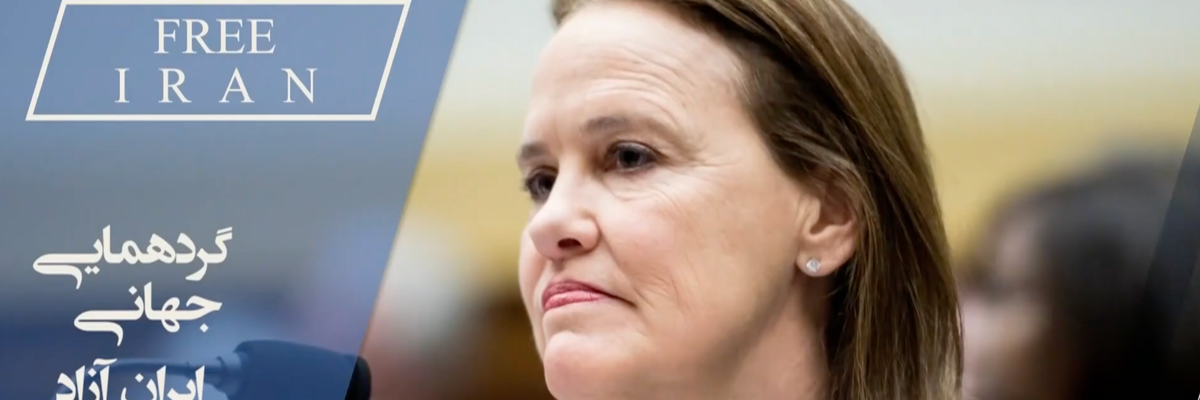Former defense official Michèle Flournoy called for regime change in Iran at a conference on Saturday sponsored by the Mojahedin-e Khalq — an Iranian militant group once listed as a terrorist organization.
A spokesperson for Flournoy’s consultancy, WestExec Advisors, which she co-founded with President Joe Biden’s now-Secretary of State Antony Blinken, attempted to walk back her appearance, telling both The Daily Beast and Responsible Statecraft:
When she agreed to the engagement, Ms. Flournoy was unaware of the affiliation. She would not have participated had she known of it, and she refused payment for the engagement once she learned of it. She has no affiliation with the MEK and will never appear at their conference again.
But at the MEK-sponsored conference, Flournoy referred to her hosts as an “important” diaspora group and called for “internal regime change” in Iran.
“When there is an internal regime change — when a government comes to power that renounces its revolutionary aims and terrorism — the United States will be the first in line to engage it,” Flournoy told this year’s Free Iran World Summit. “In the meantime, we must continue to applaud and support the important work of diaspora groups like yours that keep alive the vision of a secular, free, and democratic Iran.”
That position isn’t shared by experts at the Center for a New American Security, which Flournoy founded and whose board she continues to chair. A 2020 CNAS paper, “Reengaging Iran: A New Strategy for the United States,” described the MEK as irrelevant and ineffective.
The paper proposed diplomatic measures the next administration should undertake to, among other objectives, “de-escalate regional tensions that perpetuate instability and proxy-fueled competition in the Middle East,” and recommended exploring an “agreement on noninterference in internal affairs” which “may set a useful precedent for how regional actors can deal with one another.”
“The benefit of this agenda item is that the non-state groups involved are relatively ineffective and are not major threats to the governments in question,” said the paper. “However, these groups create deep bitterness and suspicion. For example, the Mujahedin-e Khalq (MEK) has little chance of playing a meaningful role in destabilizing or overthrowing the Islamic Republic, but international support for it absolutely infuriates Iran’s leadership.”
CNAS took an even more mocking tone toward the MEK in a 2008 blog post, writing:
Iran hawks in the U.S. can be a funny bunch, especially when they start arguing for terrorist groups opposed to the regime in Tehran to be de-listed as terror groups simply because they're the enemies of our enemies. Because the rest of the world certainly wouldn't see that as hypocritical in any way, shape or form. Oh no.
The MEK participated in the Iranian revolution of 1979, assassinating several Americans working in Iran and mocking Iranian leaders as soft for failing to execute their American hostages. But the organization soon fell out with the revolutionary regime and defected to Saddam Hussein’s Iraq.
The MEK was listed as a terrorist organization by the U.S. State Department until 2012. It has been accused of torturing and abusing its own members in exile.
However, the MEK has rehabilitated its image through its Paris-based political branch, the National Council of Resistance of Iran. Numerous Democratic and Republican politicians have appeared at NCRI conferences, sometimes in exchange for speaking fees as high as $50,000.
Senate Foreign Relations Committee Chairman Bob Menendez (D–N.J.) and former Democratic National Committee Chairwoman Donna Brazile also spoke at Saturday’s conference. So did former Secretary of State Mike Pompeo, who said that the MEK should be “blessed and protected.”
In a Twitter statement on Saturday, Iranian foreign ministry spokesman Saeed Khatibzadeh accused these politicians of selling "themselves cheap for a Europe-hosted circus arranged by a once Saddam-backed terrorist cult with Iranian blood on its hands.”
Flournoy’s voice was perhaps the most significant, as she had nearly been appointed to President Joe Biden’s cabinet earlier this year. Numerous high-profile Democrats had urged Biden to nominate Flournoy for secretary of defense, and Biden had been widely expected to do so before instead choosing General Lloyd Austin to run the Department of Defense at the last minute.
“Since 1979, every U.S. administration has had to deal with the threat posed by Iran’s revolutionary regime,” Flournoy said at the MEK-sponsored conference. “Iran’s use of terrorism abroad is paired with its systemic torture and oppression at home.”
She warned that the Iranian government “should not expect an easy ride from this administration or Congress.”
Flournoy did not respond to questions about why she chose to speak at the event or how much she was offered as payment for speaking.
















